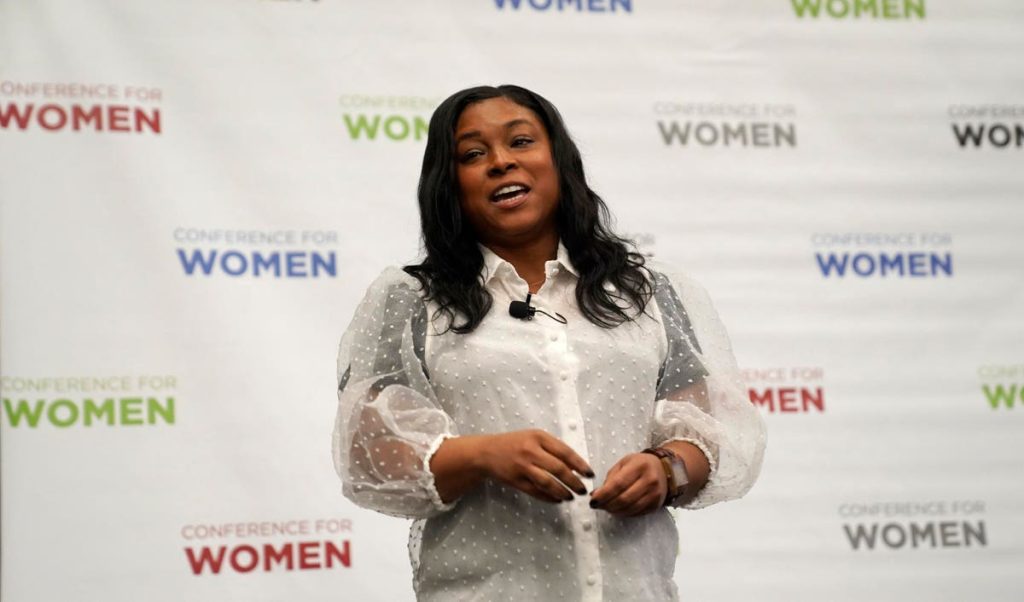Black Women’s Equal Pay Day is Thursday, July 27. Over the course of a 40-year career, Black women lose an estimated $964,400 to the wage gap. Author and career coach Octavia Goredema explains the frustration some Black female professionals feel acknowledging the day. “It shines a spotlight on the vast and debilitating impact of inequity for Black women in the workplace. Sadly, we don’t need studies to prove what we experience day in and day out. Our worth is undervalued by the systemic inequities we face every day. We are hired at lower rates. We are retained at lower rates. We are paid at lower rates. We are promoted at lower rates.”
Lean In and McKinsey’s Women in the Workplace is not only the largest study on the state of women in corporate America but also the experiences of women of color at work. The study found that Black women face disproportionately high barriers in the workplace and (even outside of pay) have the worst experience of any group.
55% of Black women leaders have had their judgment questioned in their area of expertise (vs. 39% of women leaders overall), and the same percentage of Black women leaders worry they’ll be penalized for mistakes. For these women, perception is reality, and incompetence (or any perception thereof) correlates to future growth and compensation.
Erica Morrison, a former Black female quality manager in North Carolina, shares an experience interacting with a white male manager. “When my former manager transitioned from the company, I was asked to train his replacement. The new manager and I met so I could get him up to speed on my responsibilities and current projects. While telling him about an issue we were experiencing about a product shortage, he called me a liar to my face and said he did not believe me, even after showing him evidence of what was happening. Later, I noticed that parts of my job were delegated to others (white males) without my knowledge. I eventually had no choice but to leave the company.”
The Women in the Workplace study also suggests Black women are more ambitious than white women at their level, despite the majority saying their manager shows no interest in their career. “Working in the corporate environment never felt comfortable to me. I never saw how I would rise through the ranks to get to the coveted C-Suite,” says Risha Grant, author of Be Better Than Your BS: How Radical Acceptance Empowers Authenticity and Create a Workplace Culture of Inclusion. “And, I tried. I’d been corporate America’s poster child for ‘normal,’ for how a Black woman should look and conduct herself to be accepted and heard, yet still felt unvalued.”
At most larger companies, Black women are often told to use their ambition to participate in DEI initiatives (such as employee resource groups). Many Black women are told to do this work not because of pay (as employees who participate in ERGs are not likely to receive additional compensation) but to gain visibility outside their team and accelerate career advancement.
As a result, Black women (along with LGBTQ+ women and women with disabilities) are more likely than any other group of employees, including men of color and women of different races and ethnicities, to spend a substantial amount of time on DEI work that falls outside their formal job responsibilities. Black women are stepping up to improve DEI, but will not likely be financially rewarded for doing so. Corporations financially benefit all the while, since DEI efforts can be harnessed for profitability.
Worse, their immediate line manager might not see the value in DEI initiatives, and there might be a misalignment between corporate and employee expectations for DEI. As a marketing professional I recall once being told by my company’s vice president that my DEI efforts were an “extracurricular activity,” and my direct manager agreed. Supporting DEI efforts outside of my primary role responsibilities made me seem expendable. Only 1 in 20 C-suite leaders is a woman of color, and even when DEI is a Black woman’s formal responsibility, job security is uncertain. This month alone four Black women DEI executives have either announced or exited their roles in Hollywood.
How can Black women be responsible for shortening the gender and race pay gap when the aforementioned recommended solutions aren’t working? Minda Harts, equity consultant and best-selling author of The Memo and Right Within, answers: “Black women have been working hard to advance their careers but cannot advance alone. Let us not hesitate to seek new career opportunities if we see our career needs are not being met. I don’t want Black women to forget that we are an asset, and it’s not our job to convince our employers that we belong at the table.” Grant agrees. “Sometimes, as black women, we must make space for ourselves. Our environment can play a big part in how we operate or the level at which we contribute. If you feel stifled or stunted, it’s time to move to a space that opens up for you and if you can’t find that space, then create it.”
Fortune 500 company Hershey is considered a unicorn employer; in 2021 Chief Diversity Officer Alicia Petross reported that women, Black, Latinx, and Asian employees earn the same salaries as white men. Instead of encouraging Black women to find opportunities to shine and grow (such as participating in ERGs or connecting with mentors, sponsors, and allies in leadership positions), Hershey took the onus to close the gender pay gap.
Goredema reiterated the frustration of Black Women’s Equal Pay Day among Black female professionals. “When the road is this long and this steep, we need radical action versus rhetoric. If current trends continue, it could take over a century to close the pay gap for Black women. I have two daughters, and I don’t want my future great-granddaughters to deal with the same nonsense.”
Read the full article here









